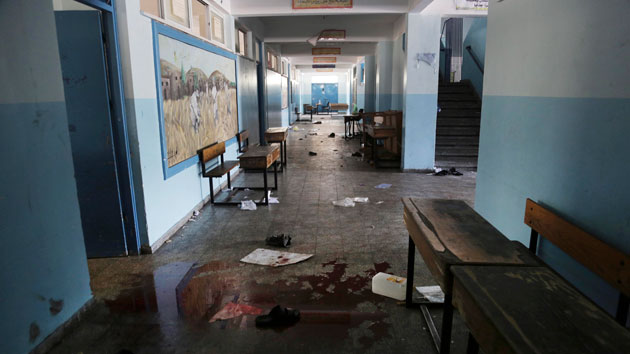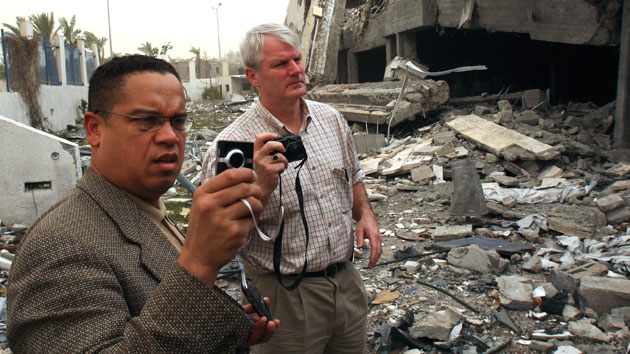
The scene at the Beit Hanoun School on July 24, shortly after an Israeli attack Adel Hana/AP
Three schools in Gaza that were severely damaged by Israeli attacks in recent days were funded by US taxpayers. The Deir El Balah Preparatory Girls School A & B, Beit Hanoun Elementary Co-ed School A & D, and Zaitoun Preparatory Girls School B in Gaza were all funded by the United States through the United Nations Relief and Works Agency, according to the UNRWA.
Deir El Balah, completed in 2013, was being used as a refuge for 1,500 Palestinians at the time it was hit on July 23. Beit Hanoun, completed in 1997, was a shelter for 1,200 internally displaced persons in Gaza when an Israeli shell hit its courtyard the following day, on July 24, killing 15. Zaitoun Preparatory, completed in 2012, sheltered nearly 2,200 Palestinians at the time it was struck on July 29. Each school cost the United States about $2 million to build, according to the UNRWA.
A fourth school, the Jabalia Elementary Girls School A & B, completed in 1960, was sheltering more than 3,200 internally displaced people when it was shelled by the Israeli military on July 30. Jabalia Elementary was funded by the European Commission. All the schools were managed by the United Nations.
“All of the UNRWA facilities in Gaza have been constructed thanks to the generosity of the international community, in which the United States is the single largest contributor,” Christopher McGrath, Washington liaison officer for the UNRWA, said in a statement. “We estimate that 95 of our facilities in Gaza have been damaged since the commencement of hostilities in 135 different incidents, with varying levels of damage.”
In a July 24 statement on the Beit Hanoun strike, the State Department said it was “deeply concerned” about the attack and repeated its demand that UN facilities be protected. “We condemn the use of these facilities to house rockets and launch attacks on civilians in Israel, and we emphasize that civilians seeking shelter in those facilities must be respected and protected, and that all parties comply with international humanitarian law,” the statement said.
The school attacks are not the first time Israeli weapons—many of which are supplied by the United States—have cost American taxpayers during the Gaza conflict. On July 29, an Israeli strike destroyed a Gaza power plant insured through the Overseas Private Investment Corporation, a US government agency, to the tune of $84 million.












